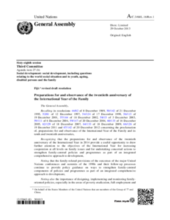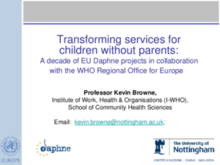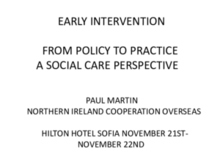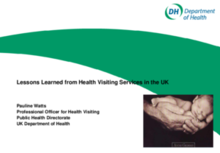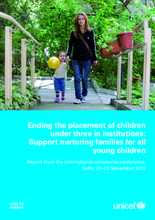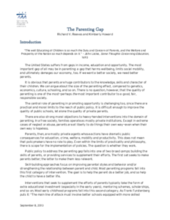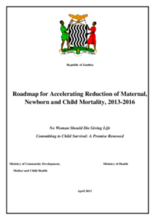Displaying 161 - 170 of 243
The United Nations General Assembly adopted on the 18th December 2013 a resolution on Preparations for and observance of the twentieth anniversary of the International Year of the Family.
This presentation to the 2012 Sofia Conference by Kevin Browne, Institute of Work, Health, and Organizations (I-WHO), School of Community Health Services at the University of Nottingham, introduces the collective findings of his research studies on the harmful effects of institutionalization of young children and major causes of child abandonment in Europe and prevention methods.
This presentation to the 2012 Sofia Conference by Paul Martin introduces family support mechanisms and services to better equip parents to care for their children.
This presentation to the 2012 Sofia Conference by Pauline Watts, Professional Officer for Health Visiting, Public Health Directorate, United Kingdom Department of Health, introduces key lessons learned in regards to preventing child abandonment by looking into intervention and support services available to children and families in the United Kingdom.
This Report from the international ministerial conference, held in Sofia, 21–22 November 2012, entitled 'Ending the placement of children under three in institutions: support nurturing families for all young children', brings together the presentations, political commitments and priority actions identified by the participants, including 20 governments from Eastern Europe and Central Asia.
This paper by the Brookings Center on Children and Families examines the scope of parenting interventions in the US that directly address poor parenting, as research has found how much parenting matters.
This study funded by Big Lottery and undertaken in partnership between the University of Bristol and Buttle UK, a grant-giving charity for vulnerable children, aims to fill gaps in understanding about the experiences of children living with kins, and in particular how children in informal kinship care view their situation.
This 5-minute animated video depicts a theory of change for achieving breakthrough outcomes for vulnerable children and families. It describes the need to focus on building the capabilities of caregivers and strengthening the communities that together form the environment of relationships essential to children’s lifelong learning, health, and behavior.
The primary goal of this research was to examine whether Malawi Social Cash Transfer Pilot Scheme, initially implemented in a rural district in central Malawi, improved health outcomes for children aged 6–17.
This Road Map is aimed at accelerating “the reduction of maternal, newborn and child mortality rates sufficiently in order to enable Zambia attain the set MDGs by 2015.”

